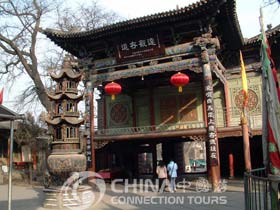 The Baiyun Taoist temple stands south of Nabinghe Rd, on the eastern bank of the Leitan River, which runs into the Yellow River at Chengguan district of Lanzhou. Also known as Patriarch Lu Temple in the Golden City, it is a famous Complete Perfection temple in Gansu and the headquarter of the Daoist Associations of Gansu and Lanzhou. The Temple was ordered built by the magistrate of Gansu Province in 1837 (Qing Dynasty) to commemorate the legendary immortal Lu Dongbin, the most well known figure among the Eight Immortals. According to Chen You's Record of White Cloud Temple Tablet, Patriarch Lu was seen traveling by the waves of the Yellow River during emperor Jiaqing's rule in the Qing dynasty. Since there was no temple exclusively dedicated to the worship of Patriarch Lu in Lanzhou, the local intellectuals appealed to Husonge, governor of Shaanxi and Gansu, that a temple should be constructed. The plan was ratified in short time. Then, led by Dang Zhongzhen, local devotees started to raise funds. In the 14th Daoguang year of the Qing dynasty, 'land for the temple was cleared up in the Northwest of the city, just beside the Yellow River'. Construction lasted for 4 years. The temple was completed in the 18th Daoguang year. Since then, it was called the White Cloud Temple, or Patriarch Lu's Temple, after Lu Dongbing. In the next year, the temple was listed among the officially recognized ritual sites as the biggest Daoist temple in Lanzhou in the Qing dynasty. Nowadays the temple remains a place of active worship and the monks here still mill about in their Taoist clothing and styled hairstyles (in a sort of bun). On arriving at the temple tourists will be confronted by an archway, in front of the main gate, that bears four Chinese characters: "Sheng Yun De Lu". The inscription, literally "the road to obtaining promotion to the clouds", is an allusion to Lu's success in reaching immortality after years of asceticism. Entering the main gate tourists will be confronted by a statue of Lu and another of the Jade Emperor (the highest ruler in the Taoist hierarchy). The temple consists of upper and lower sectors. The upper temple used to stand on the top of Mt. Jishou in Cijiaya. Today, however, nothing can be seen there. The lower sector is the White Cloud Temple we can see today.
The Baiyun Taoist temple stands south of Nabinghe Rd, on the eastern bank of the Leitan River, which runs into the Yellow River at Chengguan district of Lanzhou. Also known as Patriarch Lu Temple in the Golden City, it is a famous Complete Perfection temple in Gansu and the headquarter of the Daoist Associations of Gansu and Lanzhou. The Temple was ordered built by the magistrate of Gansu Province in 1837 (Qing Dynasty) to commemorate the legendary immortal Lu Dongbin, the most well known figure among the Eight Immortals. According to Chen You's Record of White Cloud Temple Tablet, Patriarch Lu was seen traveling by the waves of the Yellow River during emperor Jiaqing's rule in the Qing dynasty. Since there was no temple exclusively dedicated to the worship of Patriarch Lu in Lanzhou, the local intellectuals appealed to Husonge, governor of Shaanxi and Gansu, that a temple should be constructed. The plan was ratified in short time. Then, led by Dang Zhongzhen, local devotees started to raise funds. In the 14th Daoguang year of the Qing dynasty, 'land for the temple was cleared up in the Northwest of the city, just beside the Yellow River'. Construction lasted for 4 years. The temple was completed in the 18th Daoguang year. Since then, it was called the White Cloud Temple, or Patriarch Lu's Temple, after Lu Dongbing. In the next year, the temple was listed among the officially recognized ritual sites as the biggest Daoist temple in Lanzhou in the Qing dynasty. Nowadays the temple remains a place of active worship and the monks here still mill about in their Taoist clothing and styled hairstyles (in a sort of bun). On arriving at the temple tourists will be confronted by an archway, in front of the main gate, that bears four Chinese characters: "Sheng Yun De Lu". The inscription, literally "the road to obtaining promotion to the clouds", is an allusion to Lu's success in reaching immortality after years of asceticism. Entering the main gate tourists will be confronted by a statue of Lu and another of the Jade Emperor (the highest ruler in the Taoist hierarchy). The temple consists of upper and lower sectors. The upper temple used to stand on the top of Mt. Jishou in Cijiaya. Today, however, nothing can be seen there. The lower sector is the White Cloud Temple we can see today.

